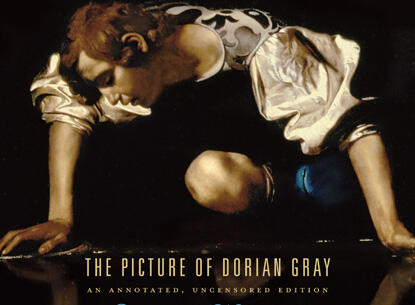
April 20, 2011
VCU professor’s research leads to an uncensored 'Dorian Gray'
Share this story
When Oscar Wilde’s “The Picture of Dorian Gray” was first published in book form in 1891, it represented a substantially altered version of Wilde’s original novel. Material considered racy for its day had been cut from the text by an editor at Lippincott’s Monthly Magazine, where the novel was initially published in serial form in 1890, and then by Wilde, who, working in response to the uproar the novel inspired, had made additional cuts before it was published in book form.
The original iteration of “The Picture of Dorian Gray” – the one Wilde meant to publish, before social norms began to eat at it – has never been available for public consumption.
Until now.
Nicholas Frankel, associate professor of English at VCU, has revisited Wilde’s original typescript and restored “Dorian Gray” to the form in which Wilde submitted it for publication. “The Picture of Dorian Gray: An Annotated, Uncensored Edition,” which Frankel edited, was published last month by the Harvard University Press. Reviews have praised the new edition and Frankel’s handling of the text. A Washington Post review called the book a “superb” annotated version of the novel and the Weekly Standard wrote that Frankel “has skillfully restored Wilde’s original version, and in the manner of other great annotated editions, supplied readers with everything anyone would need to know about Oscar Wilde, ‘The Picture of Dorian Gray’ and their lives and times.”
The long-ago cuts made to “Dorian Gray” centered on Wilde’s references to homosexuality and hints at homoerotic love between three male characters – Dorian Gray, Basil Hallward and Lord Henry. The novel that survived still contained a suggestion of this, but the restored version demonstrates a much more direct handling of the topic.
“I’m bringing it out of the closet a little more,” Frankel said.
In light of increased openness and acceptance of homosexuality in the century since the book was published, Frankel believes it was especially pertinent to publish the novel without the restraints the book once faced. Because it reflects the novel Wilde wrote before the book’s reception intervened, Frankel believes this version of “Dorian Gray” is the one Wilde “would want us to be reading in the 21st century.”
Frankel said the changes made to Wilde’s original version of “Dorian Gray” are a clear case of censorship and not mere editing. In fact, the Lippincott’s editor who made the initial deletions to the novel explained to his employer that Wilde’s submitted draft contained material offensive to innocent women and fastidious tastes and that he would remove material that would upset people.
Wilde was never given the opportunity to vet that initial censoring before it was published. Even in its reduced form, the version of “Dorian Gray” that was released to the public proved scandalous, inciting a controversy that followed Wilde the rest of his life, which included a stint in prison for “gross indecency.”
Frankel’s work on the uncensored “Dorian Gray” was borne out of his longstanding research and teaching of both the novel and Wilde himself. Frankel said the existence of Wilde’s original version of the novel was widespread knowledge among Wilde academics, but he is the first to restore the censored material.
Frankel visited the Pennsylvania Historical Society to dig up the documents related to the original draft, such as notes and correspondence, poring through the archives of J.B. Lippincott and Company, which had published Lippincott’s Monthly Magazine.
“It’s been an absolute blast to work on,” Frankel said. “You always want to try to look at the author’s hand – to look at the manuscript materials – because you can learn so much.”
One reason that Frankel pursued the restoration of Wilde’s lone novel was that he believed “Dorian Gray” marks an important milestone in the evolution of literature.
“'Dorian Gray’ is a herald of the 20th century – a herald of modernity,” Frankel said. “It helps make the transition from the Victorian to the modern and Wilde paid a very high price for that.”
Frankel said Wilde’s public persona and knack for the witty, enduring aphorism has overshadowed the quality of his work. “People feel like they know him, but they haven’t read him,” Frankel said. For all of his cleverness, “Wilde was very serious about his own artistry and about the idea that art is a serious business.”
“I hope this sparks a reconsideration of him and his writing and the way his personality saturates his writing,” Frankel said. “I hope it brings more attention to his work.”
Subscribe to VCU News
Subscribe to VCU News at newsletter.vcu.edu and receive a selection of stories, videos, photos, news clips and event listings in your inbox.







